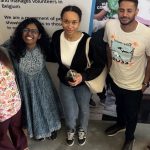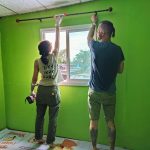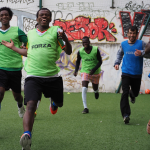by Peter DeWit
What would you say is the best way to change perspectives and paradigms? May I suggest to you that it is through storytelling? As we tell our stories something happens inside of the listener: understanding, solidarity and sometimes a desire to change. I’ve been told that I am a storyteller. I love telling stories, always have. Week after week I find myself on the streets of Paris bringing sustenance and encouragement to those in an uphill battle. They have been traumatized by homelessness, loneliness, substance abuse, and violence; this flow of humanity battered by poverty, relational dysfunctions, and hopelessness. Faced with these heavy challenges I ask myself how can we, as volunteers and humanitarians, make a difference?
I have been part of Serve the city Paris for about four years now. When I joined we were a small group of volunteers without much organization. I’ve seen growth structurally, strategically, and in the quantity and quality of our volunteers. Maybe part of the growth could be attributed to marketing, but the lion’s share is all about getting the word out. We are walking stories, each one of us, but we’ve also shared our stories through words, pictures, and videos. And many have responded with the giving of their time, donations and talents. Last week one of our newer volunteers walked with me connecting with the homeless, afterwards she looked at me with tears in her eyes, “I had no idea how needy these streets were.” And I knew the stories she heard that morning touched her as she vowed she would be back again to help.
I walked along the Seine River with Porus Jain, he’s a photography student in his final year. If you’ve met him, you know he’s not just passionate about photography, but about telling other people’s stories. He knows more than most of us the power of the saying, “a picture is better than a thousand words.” He grew up in a well to do home in Delhi, but his heart was touched by those not so fortunate in his city and country. If you asked him what’s behind his passion for photography you might hear him say that the stories are crying to be told and if we don’t tell them who will? This is the only way we can change the world. And I would say yes to Porus, our broken world has to hear about both the struggles and the hopes, the despair and the challenges of the marginalized. It’s the best way we can learn, love and change society.
We live in a world crying out for stories. How do we tell them? Which ones should we tell? These are important questions for those who work with non-profit organizations. There are too many misconceptions that need stories to counteract the negative stereotypes and biases about the migrants, refugees, and the homeless. If we stay silent our populations will wrongly assume all is well with the situations of those that fall into the category of marginalized. And so we ask our friends, those without a country, a home and vulnerable to so much, to speak to us. We want to listen in order to understand and make visible that which society wants to keep out of sight.
When I lived in Bangkok, there was an influx of Pakistani refugees. Many came to me and asked for help. I couldn’t do much, but I could tell their stories. And it came to pass when someone listened in Canada. They responded by saying we want to sponsor this family to find a new life on Canadian soil. It took many years to happen. But today they have a new life in Toronto. I visited them in November. Their children jumped all over us with happy energy. It was Halloween. They couldn’t wait to show Patricia and I their costumes. And after a wonderful Pakistani meal the girls got dressed and we headed out to trick or treat. Angel, the oldest girl, now nine years old said, “This is the best day of my life, I get to be with Uncle Peter and Auntie Patrica and go trick or treating!” Farzana, her mom smiled at me as I remembered her words describing Canada, “This is a place of freedom. We have found freedom.”
There are countless others searching for freedom. It’s why they left their family and country. Their path to hope and new life, like Sajjad and Farzana’s, started with the experience of great personal hardships. And we come alongside with friendship. Eventually, we learn of their stories and want the world to hear them, not for entertainment or for personal benefit, but our storytelling is on their behalf, for their freedom. And in the telling of their stories we reframe for the audience their own understandings, helping them to let go of their biases, and ask them to engage the other with deeper kindness. This is the beginning of freedom.







